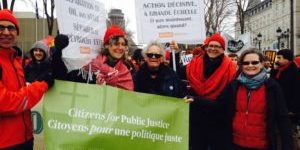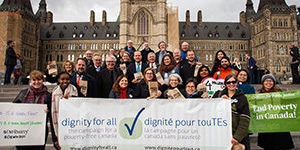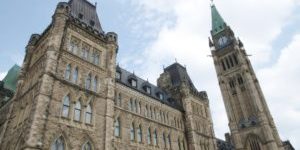At the close of Governor General Mary Simon’s first Speech from the Throne, she called on parliamentarians to “be equal to the profound trust bestowed on you by Canadians,” and wished that Divine Providence guide them in all their duties.
For Citizens for Public Justice, this resonates deeply. A parliament worthy of trust is precisely what is needed to cultivate a vibrant democracy where all people and all of creation are honoured, protected, and flourish in harmony.
The priorities named in today’s Throne Speech reflect a desire for these kinds of conditions. Promoting physical and mental health, moving forward in reconciliation, building a more resilient economy, addressing climate change, and cultivating safer, more inclusive communities were all named as imperatives for this parliamentary session. The real test begins now.
A critical measure of trust is whether or not a government keeps its promises. A number of election commitments were echoed in this Throne Speech, though notably many of these represent work committed to in previous sessions that was left unfinished.
While the pandemic certainly affected people’s capacity, there were also instances in the last parliamentary session where we saw how quickly and collegially MPs could work together when there was sufficient political will. A trustworthy parliament must put partisan politics aside to face the multiple environmental and public health crises that have been brewing for generations. No one parliamentary session can be expected to do all that is needed, but their ambition and impact must reflect the urgency of the situation.
To this end, Governor General Simon also encouraged parliamentarians to “seek out the truth, and to learn about the lived realities in First Nations, Inuit and Métis communities” in each of their ridings. The same principle can be applied to others historically marginalized in Canadian society. Each of these communities are often the most directly impacted by public policy decisions, but the least likely to be included in decision-making processes. To prove trustworthy, parliamentarians must listen to, and be willing to be changed and led by these voices. There must be meaningful accountability mechanisms to ensure that these voices and experiences are not dismissed through ineffectual consultation processes, or crowded out by those with more economic and political privilege.
As with most Throne Speeches, particularly in the context of a minority government, today’s address was big on ideals, but lighter on details.
In addressing climate change, for example, Governor General Simon spoke of commitments to respect Indigenous knowledge, the need to go “further, faster,” and “moving to cap and cut oil and gas sector emissions.” We support the direction set by these statements; indeed we have long pressed for faster, more far-reaching, more ambitious climate action. Unfortunately, the federal government still owns a pipeline, contributes nearly $18 billion in subsidies to the fossil fuel sector, and as recently as last week, sent the RCMP to forcibly remove Wet’suwet’en land defenders from their unceded territory.
Plans to build a more resilient economy require significant investment in a just transition to a green, inclusive, sustainable economy. This means retooling and retraining oil and gas workers, while also addressing the systemic barriers faced by Indigenous Peoples, women, and newcomers in the energy sector.
An “economy that works for everyone” must also include important programs like housing investments, a Canada Child Benefit (CCB) indexed to inflation, and a Canada-wide early learning and childcare program. But the common expression of supporting “the middle class and people working hard to join it” belies the fact that many of these programs leave out those with the lowest incomes, facing the greatest barriers to socio-economic success and physical and mental well-being. Housing efforts focusing on homeownership instead of affordable (and accessible) rental units, tying eligibility for the CCB to immigration status and restrictive definitions of family and caregiving roles, and even the critically important $10 a day child care largely benefit the middle class while leaving many of the most marginalized unable to access or afford these programs.
Immigration was rightly identified as essential to sustaining Canada’s economy, with commitments to increasing immigration levels and bolstering family reunification programs. Canada’s “world-leading refugee resettlement program” should reflect the responsibility we have to the global community and the significant contributions that newcomers make to Canadian society. Here, too, investment and follow-through are key. Commitments were also made to empowering Black and Indigenous communities and combating hate and racism through a renewed Anti-Racism Strategy. For parliamentarians to merit the trust of immigrants, refugees, and racialized people born in Canada, however, more needs to be done to remove the barriers to equal socioeconomic and health outcomes for these populations, particularly as plans are made to transition to a green economy.
Will parliamentarians prove trustworthy to the millions of people in Canada experiencing food insecurity, housing insecurity, or poverty? Will they prove trustworthy to First Nations, Inuit, and Métis land defenders and knowledge keepers, as well as others on the front lines of the climate emergency? Will they prove trustworthy to children and youth, who will inherit their legacy?
May Divine Providence guide them, indeed. We at CPJ will be here to support parliamentarians in the development and implementation of just public policy. And may we, too, prove trustworthy to one another in our actions and advocacy.




